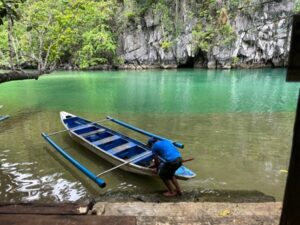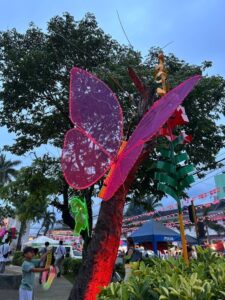Hello from the Philippines! My name is Dana Thompson, and I am currently completing my practicum with Roots of Health in Palawan, Philippines. I am working with the Youth Team here creating harm reduction modules for people living with HIV and updating their sexual health education modules. My trip began with about 45 hours of traveling from the time I left my apartment in Chapel Hill to when I arrived at my apartment in Puerto Princesa. I had never traveled this far and had never been out of the United States for so long, so there was much to adjust to. I settled into my apartment which sits above my host named Mitch and her family. After settling into my new home, I tried to keep my eyes open for as long as I could to adjust to the 12-hour time difference but eventually sleep won and I wound up falling asleep around 6 pm. Later, on my second day I took a ride on my first trike, which is a motorcycle with a cab attached to the side of it to meet my fellow interns for dinner. This would be the beginning of many firsts that I have already gotten to experience while here.

On my first day of work, I was excited to learn that the Youth Team at Roots of Health is the loudest team which meant that I would fit right in. One of my favorite activities that I did during my first week here was attend an outreach event with the Clinical Team where we traveled to Aplaya to disseminate contraceptive resources to women in the community. While we were there, we were talking to community advocates and the clinical director who had been working with members of the community for years. She told stories of the amazing successes of traveling to the community. Many of the women had been coming to the events for years and would only stop attending if they wanted to get pregnant or had started menopause. These outreach events are crucial to the community because these resources that would have been difficult for members of the community to access without Roots of Health traveling to them. She also detailed stories of women who were forced to stop accessing birth control when their husbands left for long fishing trips because their husbands were afraid that they would cheat. Stories like this are demonstrative of societal norms that do not view a person’s reproductive choices as their own.

In addition to my work on the modules, I have also had the privilege of attending two sexual health education classes in Aborlan, the municipality just south of Puerto Princesa. I got to see firsthand how engaging and passionate the people I work with are during these trainings which result in stark improvements in understanding among participants from the pre and posttests. It made me so excited to continue working here and to begin developing my deliverables. There are some significant issues that surround sexual and reproductive health in the Philippines. One of these issues is that the Philippines has the fastest growing HIV epidemics in the Asia-Pacific region and most of the new cases are among people aged 15-35 and men who have sex with men. There are many factors contributing to this issue, some of them include stigma, lack of access to comprehensive HIV education, and limited access to reproductive health resources, including condoms. In addition to this issue, the Philippines has serious concerns surrounding teen pregnancy. The United Nations Population Fund states that about 9% of girls aged 15-19 have already had at least one child; this is also influenced by factors including limited access to reproductive health education and resources and stigma. I am so excited to continue learning from and working with this team while exploring this beautiful island.

Dana
